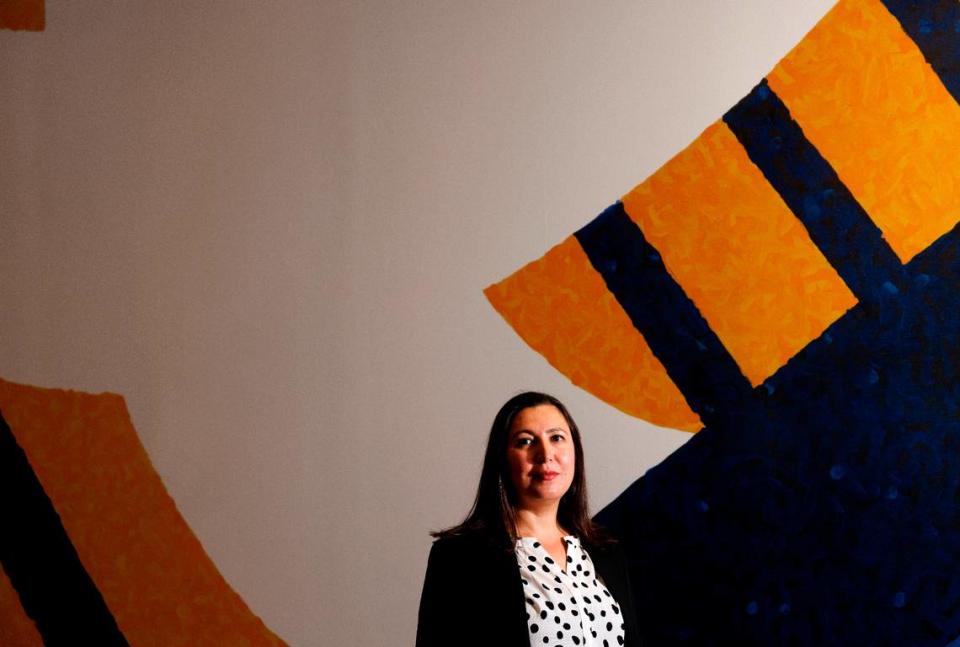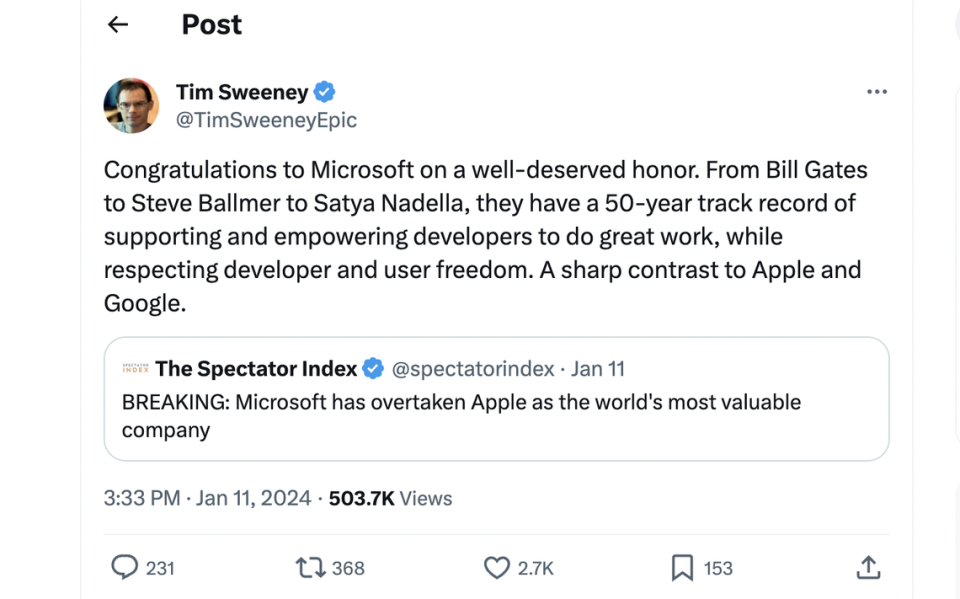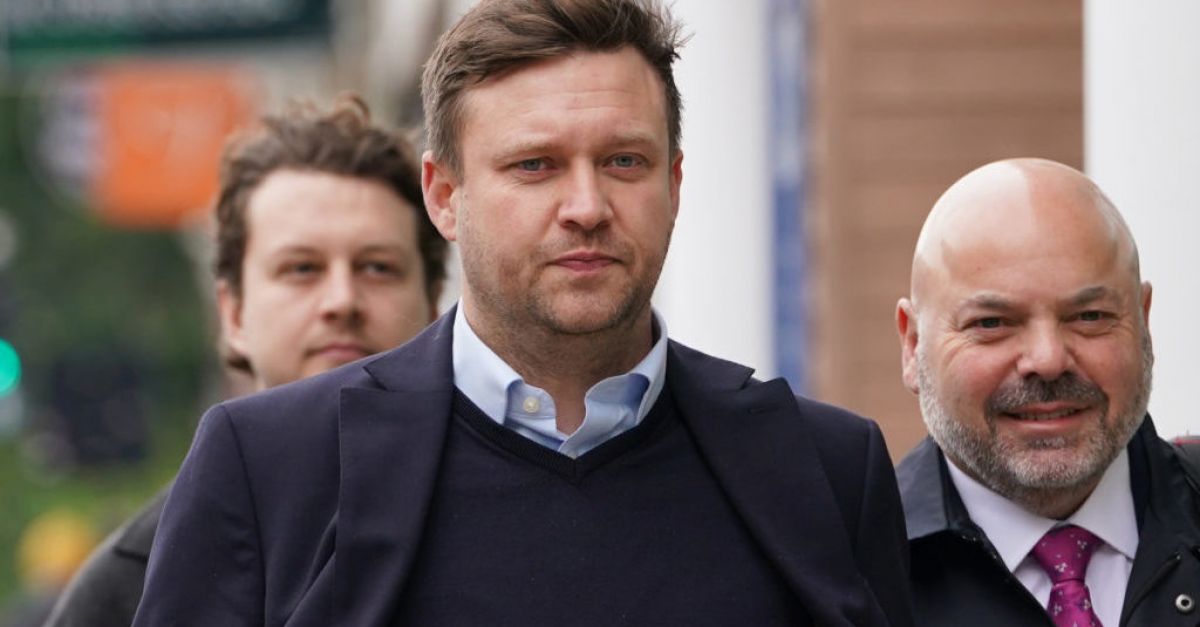I’m Brian Gordon, tech reporter for The News & Observer, and this is Open Source, a weekly newsletter on business, labor and technology in North Carolina.
The Supreme Court is the final law of the land. So when it declined this week to take on the antitrust case between Apple and Cary’s Epic Games, it seemed the three-year-plus legal dispute between the iPhone maker and the Fortnite creator had been put to rest.
The lower courts’ rulings would stand, making Apple mostly the victor. In September 2021, a district court judge determined Apple does not operate an anticompetitive monopoly through its App Store and in-app payment system. But Epic, for all its time and money, had secured a win in that verdict, too.
The court ruled Apple could no longer prevent app developers from directing users to external (and presumably less expensive) payment platforms. Apple charges developers 15-30% fees for selling through the App Store. Apple’s anti-steering restriction went into effect on Tuesday when the Supreme Court declined to hear the case.
Epic Games CEO Tim Sweeney immediately celebrated the removal of anti-steering, writing on X that “as of today, developers can begin exercising their court-established right to tell US customers about better prices on the web.”
But then Apple released its compliance plan Tuesday, and Sweeney’s frustration mounted.
Apple announced it will charge U.S. App Store developers a 27% commission on sales of digital goods and services made through external payment systems. Apple called it “a reasonable means to account for the substantial value Apple provides developers, including in facilitating linked transactions.”
Sweeney, and many developers, called it a travesty.
“Apple has never done this before, and it kills price competition,” Sweeney wrote. “Developers can’t offer digital items more cheaply on the web after paying a third-party payment processor 3-6% and paying this new 27% Apple Tax.”
Epic Games is the creator of Fortnite, the globally popular game that has been at the center of Sweeney’s antitrust battles with both Apple and Google. The developer wants to offer iPhone users the ability to pay for Fortnite’s in-game currency, called V-bucks, through its own payment platform.
Sweeney, who is North Carolina’s second-wealthiest person, had other issues with Apple’s plan, including so-called “scare screens” that warn iPhone users before they navigate to external payment systems. “Epic will contest Apple’s bad-faith compliance plan in District Court,” he wrote.

Some legal scholars agree with Sweeney’s “bad-faith” description.
“It nearly recreates the conduct — requiring all in-app purchases to go through Apple and taking a 30% cut,” said Rebecca Haw Allensworth, an antitrust professor at the Vanderbilt University Law School. “If developers can’t offer a discount to consumers, its unlikely they will be able to lure them out of the Apple universe.”
Spotify also lambasted Apple’s new App Store policy.
“Once again, Apple has demonstrated that they will stop at nothing to protect the profits they exact on the backs of developers and consumers under their app store monopoly,” Spotify told the N&O. The audio streaming service said Apple’s 27% charge “is outrageous and flies in the face of the court’s efforts to enable greater competition and user choice.”
So, are Epic and Apple destined to be back in court? Maybe.
“I think given that (Apple’s) policy does almost nothing to address the competitive concerns in the courts’ decisions supports that idea that (Epic) will challenge it and have a good chance of succeeding,” Allensworth said.

Yet others who are critical of Apple’s new 27% fee are less confident Epic has the legal standing to knock down the tech giant.
“It is outrageous, but it is not illegal under the federal antitrust laws to charge an exorbitant price,” said Elanor Fox, an antitrust professor at New York University who has previously done consulting work for Epic. “Our federal antitrust law does not prohibit high prices, no matter how high.”
Epic v. Apple began in the summer of 2020. For a moment this week, it seemed to have concluded. Now, stay tuned.
Above, around and on the ground at VinFast
From the ground, there are signs the Vietnamese electric car company VinFast is progressing on its planned multibillion-dollar assembly plant in eastern Chatham County, about 30 miles southwest of downtown Raleigh. I drove by the 1,765-acre site one weekday last month and saw trailers, machines and construction workers gathered near the entrance.
VinFast broke ground there in July, and the Chicago-based developer Clayco is leading the project.

From above, it’s clear the automaker has a lot of work to do if it’s to meet its current commitment to open sometime in 2025. Aerial drone photos from N&O photographer Travis Long show wide swathes of reddish-brown dirt where the factory is expected to stand.
And around the site, the North Carolina Department of Transportation has started negotiating with property owners to acquire land needed to build a highway interchange and four-lane access road. At least one property owner is not pleased.
How much has local VC funding fallen?
Local venture capital activity was quiet at the end of 2023, according to new data from the analysis firm Pitchbook.
In the final three months of the year, only 23 deals were completed across metro Raleigh and Durham, compared to 40 deals during the same period in 2022 and 58 deals during the same period in 2021.

Venture investing declines were seen nationwide, with Pitchbook attributing the drop to foreign political risks.
North Carolina investors concur. “There was already a lot of concern in the venture world and the geopolitical events of (October) seem to have really tipped folks into pause everything mode,” said Triangle Tweener Fund founder Scot Wingo. “They do seem to be loosening now with the prospects of lower interest rates and inflation in 2024.”
Short Stuff: Defining plagiarism in an AI world
-
Congress has proposed a bipartisan bill to defer the so-called Section 174 “innovation tax,” which several Triangle startup founders say has threatened to torpedo their research-based businesses. A few shared their challenges with me last month.

-
“Rethink” student plagiarism? The North Carolina Department of Public Instruction released new guidelines for how K-12 students can use generative artificial intelligence tools like ChatGPT to help complete assignments.
-
A Pokémon Regional Championship is being held this weekend in Charlotte with up to $50,000 in prizes and scholarships on the line.
-
Back to VinFast: The automaker delivered 34,855 electric vehicles globally last year, short of its 2023 goal of 50,000 deliveries.
“Our 4Q23 saw a jump in vehicle deliveries compared to prior quarters,” VinFast’s head of sales Tran Mai Hoa said in a statement Thursday. “However, amid economic headwinds, slow EV adoption rate in certain regions has adversely affected deliveries plan.”
National Tech Happenings
-
Young tech workers are leaving big coastal cities for the livability of Boise, Idaho.
-
NASA showcased its new “quiet” supersonic jet, the X-59 Quesst, which the agency plans to use for regular, non-space travel. It hopes to test the jet later this year. Speaking of planes that move really fast, the Greensboro-bound startup Boom Supersonic is asking federal aviation regulators to greenlight its own supersonic test flight.
-
Microsoft has topped Apple as the world’s most valuable public company. Did Tim Sweeney celebrate the news? You bet.
Thanks for reading!

Open Source
Do you enjoy Triangle tech news? Subscribe to Open Source, The News & Observer’s weekly technology newsletter and look for it in your inbox every Friday morning. Sign up here.
Signup bonus from





